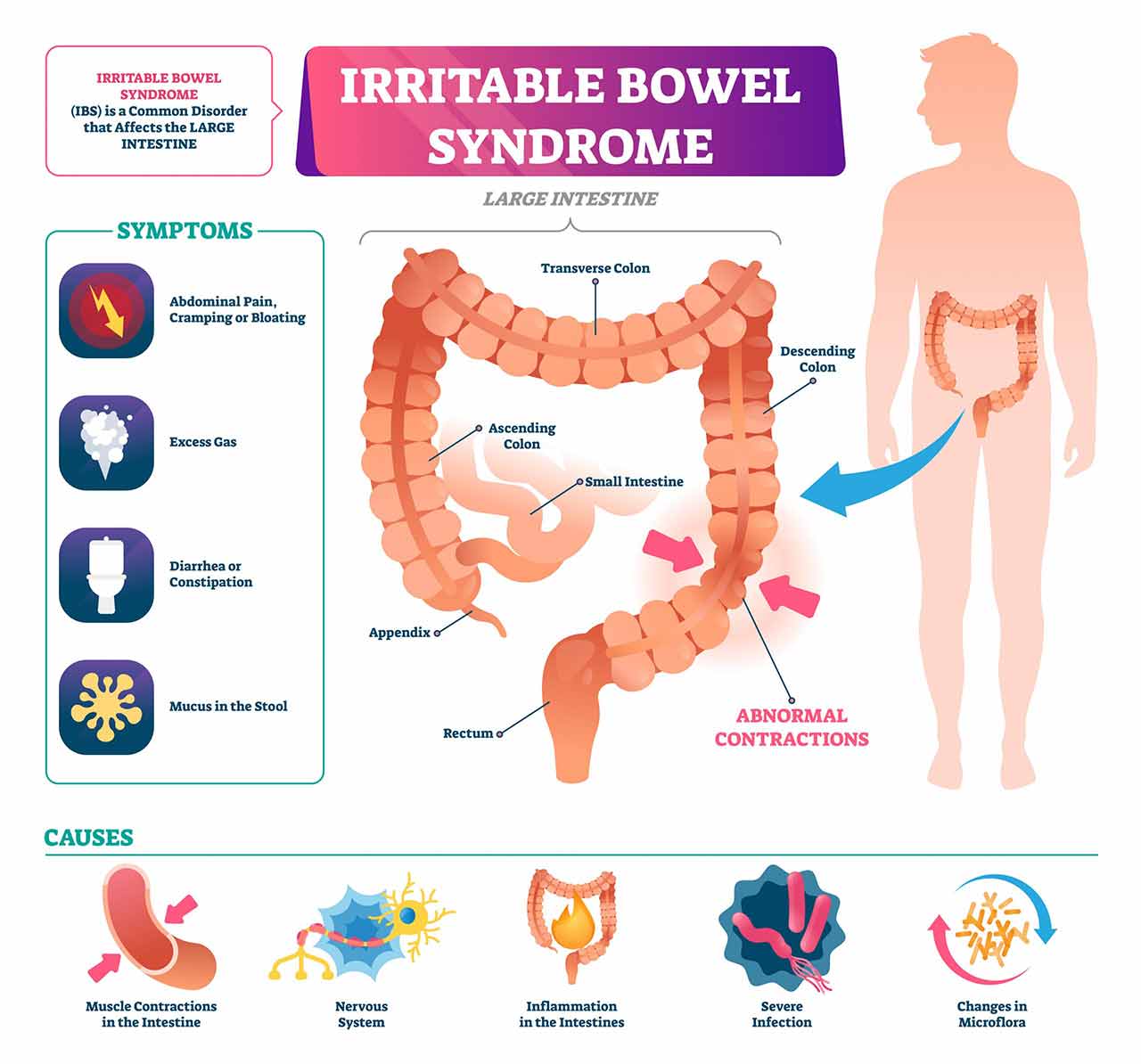IBS Nutrition Therapy & Advice –
IBS is thought to affect 17% of people in the UK, with women more likely to be affected than men. It is a very common disorder that affects digestion, especially by interfering with normal function of the large intestine. IBS is not a single disease but rather an umbrella-term which identifies a group of symptoms which can include:
- Diarrhoea and/or constipation
- Stomach cramps or pain
- Bloating and flatulence
This means that each person with IBS can struggle with different symptoms and have their own unique triggers. Symptoms can come and go, or last for days, weeks or months, and can severely impact quality of life for the sufferer. Carmen provides an IBS nutrition therapy service to help improve symptoms.

Many signs of IBS have been linked to food sensitivities and/or intolerances, stress, intestinal permeability or leaky gut, and dietary and lifestyle changes, medication, exercise and even anti-depressants are often prescribed to manage the symptoms of IBS. A nutritional therapy approach, however, can unearth and address the potential underlying causes and triggers of IBS such as:
- Stress
- Lack of digestive enzymes
- Infections, parasites or yeast overgrowth in the gut
- Mineral deficiencies
- Nutritional deficiencies
- Heavy metal toxicity
- SIBO (Small Intestine Bacterial Overgrowth)
- Gut dysbiosis (an imbalance of the types and volumes of bacteria in the gut)
- Intestinal permeability, also known as leaky gut
- Non-coeliac gluten sensitivity and other intolerances
- Eating a highly-processed, usually low fibre diet
- Use of certain medications that can cause constipation or diarrhoea
- Poor lifestyle choices such as smoking, high caffeine and alcohol consumption
Inflammatory Bowel Disease (IBD)
IBDs are more severe than IBS and also more difficult to treat. IBD tends to cause severe symptoms such as frequent diarrhoea, bloody stools, malabsorption of nutrients and ulceration of the digestive tract.
The term is usually used to describe Crohn’s Disease and Ulcerative Colitis which involve inflammation of the gut. Crohn’s can affect any part of the digestive system, whilst Ulcerative Colitis only affects the large intestine.
Conventional treatment aims to address the symptoms of these diseases and include special diets, lifestyle changes, medication and often surgery in around 60-75% of people with Crohn’s.
There is no firm agreement on what causes these conditions but it is believed that genetics, an abnormal response of the immune response to bacteria, viruses or other pathogens in the gut, smoking, stress and diet may play a part.
IBS is thought to affect 17% of people in the UK, with women more likely to be affected than men. It is a very common disorder that affects digestion, especially by interfering with normal function of the large intestine. IBS is not a single disease but rather an umbrella-term which identifies a group of symptoms.
How Does IBS Nutrition Therapy Help?
After taking a full medical history and reviewing your food & lifestyle diary, a nutritional specialist in IBS will consider all the potential causes of your IBS or IBD and identify and prioritise the next steps to be taken that are relevant to you. These may include:
- Recommending dietary changes which may include elimination of certain foods to establish connections to your symptoms
- Referring you to your GP for further testing
- Recommending Functional tests to pinpoint imbalances in your body systems
- Suggesting nutritional supplements or specific probiotics
- Advising on lifestyle changes including exercise and relaxation techniques
Your personalised recommendations will be reviewed at each appointment to evaluate how they have been incorporated into your life and how effective they have been and your plan will be amended and updated accordingly. A course of 4 appointments, 4 to 6 weeks apart is recommended for optimal outcomes to track progress over time.
Nutrition Diets specialises in gastrointestinal disorders and has been successful in helping many patients identify and address the root cause of their IBS and IBD with personalised action plans that have helped restore and improve their digestive health.
If you are in need of IBS nutritional therapy, please get in touch with a nutritional specialist here.